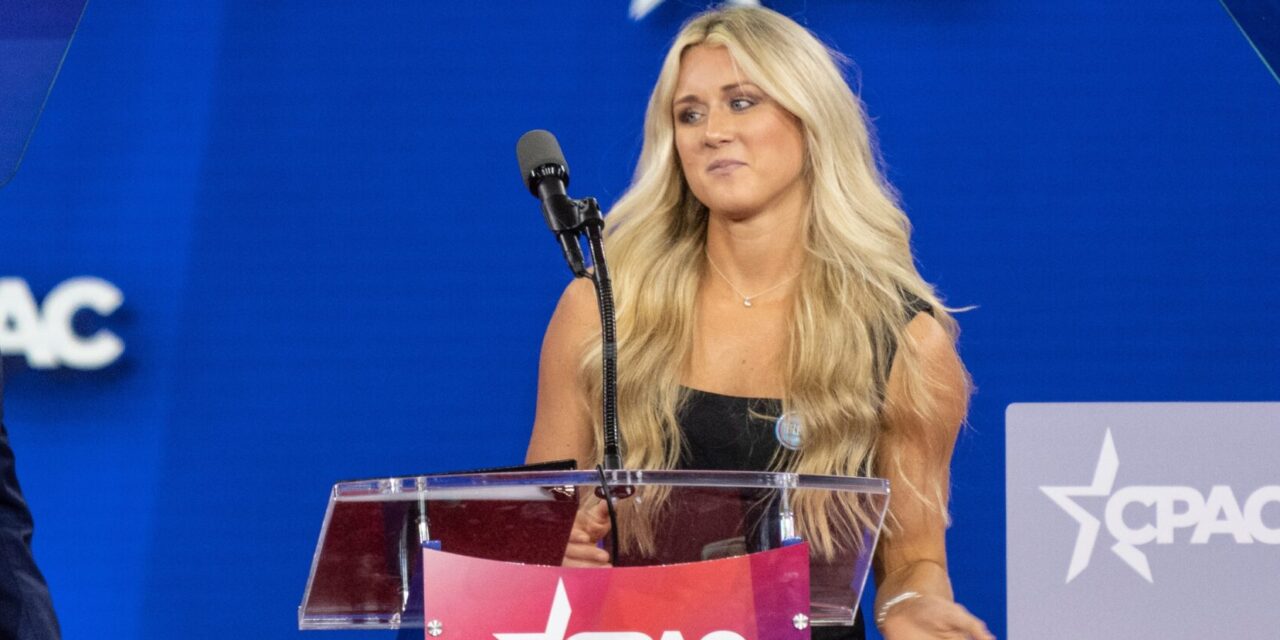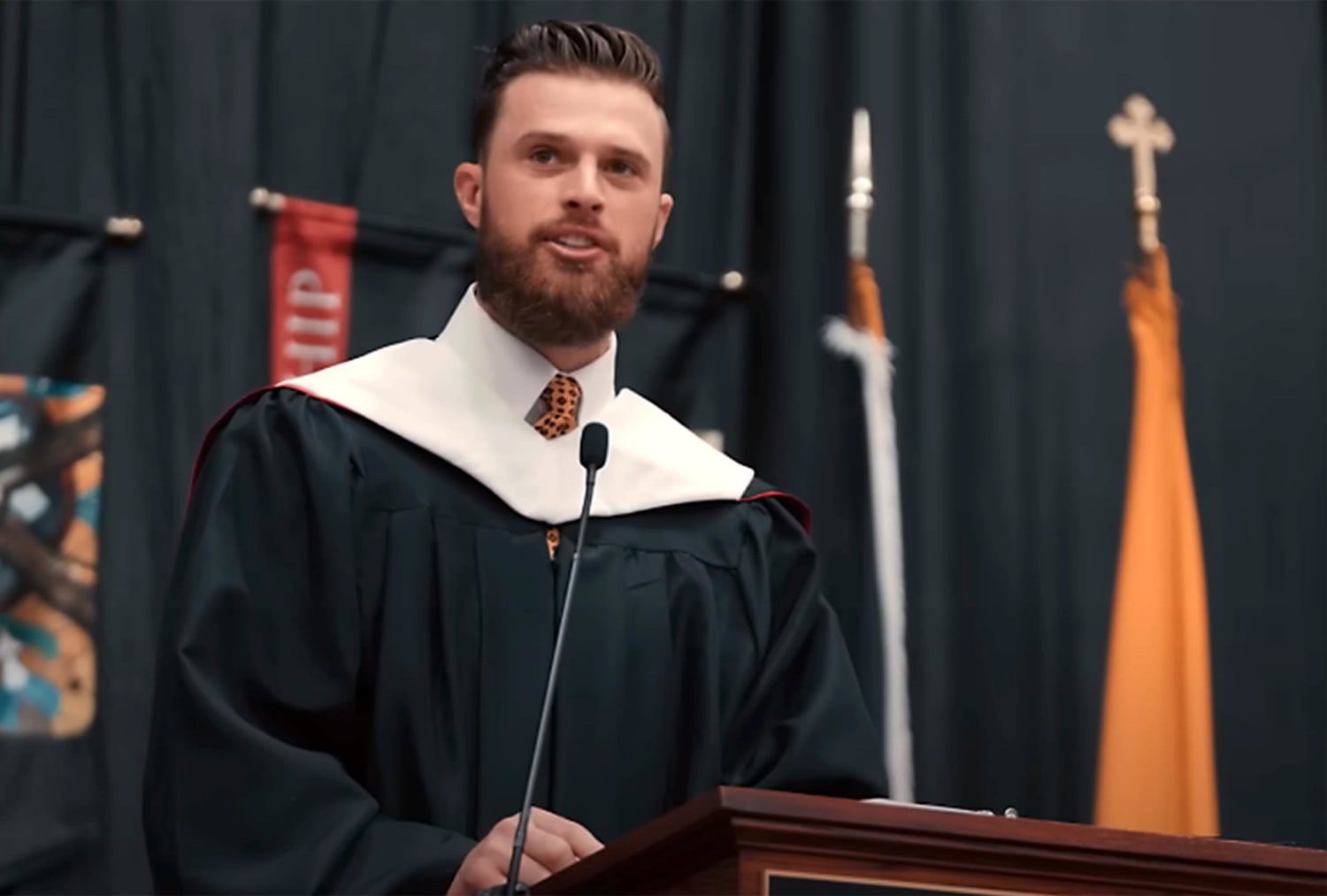Harrison Butker’s controversial commencement speech — and the reaction to it — continue to dominate conversation off the field, with key figures in the NFL weighing in publicly for the first time this week.

The Kansas City Chiefs kicker stirred up a culture war skirmish with his remarks at Benedictine College earlier this month, in which he denounced abortion rights, Pride Month, COVID-19 lockdowns, “dangerous gender ideologies” and “the tyranny of diversity, equity and inclusion,” while also encouraging female graduates to embrace the “vocation” of homemaker, all in 20 minutes.
The speech, which has since racked up nearly 2 million views on YouTube, resonated with some football fans and conservative public figures, including Missouri Sen. Josh Hawley. Online sales of Butker’s jersey spiked, becoming the Chiefs’ best-seller.
But the speech has drawn widespread criticism from many corners of the internet, including some current and former students of the Catholic liberal arts college, an order of affiliated nuns, Kansas City officials and fans of Taylor Swift, whom Butker quoted in the speech as “my teammate’s girlfriend.”
The NFL distanced itself from Butker’s comments in a brief statement last week, saying he made them “in his personal capacity” and “his views are not those of the NFL as an organization.”
“The NFL is steadfast in our commitment to inclusion, which only makes our league stronger,” it added.

NFL Commissioner Roger Goodell echoed that idea while speaking to reporters on Wednesday.
“We have over 3,000 players,” Goodell said, according to Yahoo Sports and the Associated Press. “We have executives around the league that have a diversity of opinions and thoughts just like America does. I think that’s something that we treasure, and that’s part of, I think, ultimately what makes us as a society better.”
But some social media users were quick to contrast Goodell’s comments with his reaction to another high-profile controversy involving a football player exercising his right to self-expression: that of former San Francisco 49ers quarterback Colin Kaepernick.

When it comes to players’ self-expression, some see a double standard
Kaepernick, who is biracial, began sitting on the bench and subsequently kneeling during the playing of the national anthem in the 2016 preseason to protest what he called “the injustices that are happening in America.”
The actions prompted criticism from many — including then-candidate Donald Trump — who in August 2016 accused him of being anti-American.
Goodell made a similar critique of Kaepernick’s protest.
“I think it’s important if they see things they want to change in society, and clearly we have things that can get better in society, and we should get better,” Goodell said in his first public comments on the protest in September 2016. “But we have to choose respectful ways of doing that so that we can achieve the outcomes we ultimately want and do it with the values and ideals that make our country great.”
Kaepernick continued to kneel during the anthem for the rest of the season, inspiring some other players to do the same.
The following year, as the number of players kneeling — and the backlash to them — grew, Goodell told NFL teams in a memo that “everyone should stand” during the national anthem.
“The controversy over the Anthem is a barrier to having honest conversations and making real progress on the underlying issues,” he wrote. “We need to move past this controversy, and we want to do that together with our players.”
Kaepernick opted out of his contract with the 49ers in the spring of 2017 but wasn’t signed by any NFL team afterward, which led his supporters to accuse league owners of freezing him out because of his political beliefs. Kaepernick alleged the same in a grievance filed against the NFL later that year, which he withdrew after settling in 2019.
He hasn’t played professionally since but has continued his career as a civil rights activist and author.
In June 2020, as protests against racial injustice and police brutality rocked the U.S., and after players called on the NFL to speak out, Goodell released a video statement condemning racism and acknowledging the league’s shortcomings in that area.
“We, the National Football League admit we were wrong for not listening to NFL players earlier and encourage all to speak out and peacefully protest,” he said, without naming Kaepernick.
Goodell doubled down in a series of remarks that summer, including encouraging an NFL team to sign Kaepernick as a free agent and publicly apologizing.
“I wished we had listened earlier, Kaep, to what you were kneeling about and what you were trying to bring attention to,” he said.
On Wednesday, X (formerly Twitter) users and op-ed writers called Goodell’s comments hypocritical and wondered aloud what Kaepernick thinks of them. Some acknowledged that their situations differ, since Kaepernick protested in uniform during games while Butker made his speech off the field.
Kaepernick hasn’t commented publicly on Butker’s speech or Goodell’s response.
Last week, as controversy over Butker’s comments brewed, The View co-host Whoopi Goldberg said Butker and Kaepernick deserve equal respect for expressing their views.
“These are his beliefs and he’s welcome to them,” she said of Butker. “I don’t have to believe them, I don’t have to accept them, the ladies that were sitting in that audience don’t have to accept them.
“The same way we want respect when Colin Kaepernick takes a knee, we want to give respect to people whose ideas are different from ours because the man who says he wants to be president … he says the way to act is to take away people’s right to say how they feel. We don’t want to be that, we don’t want to be those people.”
Some Chiefs leaders have also spoken up for Butker
More members of the Chiefs acknowledged the controversy on Wednesday, coming to Butker’s defense.
Star quarterback Patrick Mahomes told reporters, “There are certain things that he said that I don’t necessarily agree with but I understand … he’s trying to do whatever he can to lead people in the right direction.”
He added that he’s known Butker for seven years and considers him a good person.
“I judge him by the character that he shows every single day,” he said. “That’s someone who cares about the people around him, cares about his family and wants to make a good impact in society.”
Chiefs Head Coach Andy Reid also addressed the response to the speech, though stayed away from its contents. He said he hadn’t talked to Butker about it because “I didn’t think we needed to.”





